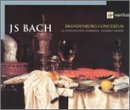| All Artists: Johann Sebastian Bach, Siegbert Rampe Title: J S Bach: Brandenburg Concertos Members Wishing: 0 Total Copies: 0 Label: Virgin Records Us Release Date: 2/18/1997 Genre: Classical Styles: Forms & Genres, Concertos, Historical Periods, Baroque (c.1600-1750) Number of Discs: 1 SwapaCD Credits: 1 UPC: 724354525520 |
Search - Johann Sebastian Bach, Siegbert Rampe :: J S Bach: Brandenburg Concertos
 | Johann Sebastian Bach, Siegbert Rampe J S Bach: Brandenburg Concertos Genre: Classical
|
Larger Image |
CD Details |
CD ReviewsAgainst the Grain Leslie Richford | Selsingen, Lower Saxony | 09/06/2004 (4 out of 5 stars) "If your are looking for a well-recorded, aesthetically satisfying version of Bach's Brandenburg Concertos on period instruments for hours of relaxing listening, then I'm afraid you should probably go elsewhere (I recommend the English Concert directed by Trevor Pinnock on Deutsche Grammophon Archiv), for the German recording presented here by Siegbert Rampe and his ensemble La Stravaganza Hamburg is one that definitely goes against the grain. It is intellectually challenging and stimulating, yes, but also acoustically difficult and decidedly discomfiting. In a sense, it is a musicologists' recording aimed at those who already know the Brandenburg Concertos really well and now want to dissect them for their better understanding.
The two Cds in the set were recorded two years apart (1993 and 1995), and the second of the two was originally released on its own by the now-defunct label Intercord. It is this second disc that one should really listen to first, not only because it was recorded first, but also because it is easier to listen to and gives a much better impression of the whole. Concertos 4 and 5, the earliest version of Number 5 (BWV 1050a) and the Triple Concerto BWV 1044 are all played here with considerable gusto but also with a good degree of elegance. This, combined with the excellent recording technique, makes for exciting listening, although the attentive listener will notice certain unusual elements: The tempi of the fast movements are fast, requiring some virtuoso feats from the musicians; and the pitch is very low (a'=392 Hz). But all in all, the second Cd is among the best that I have heard. The first CD (Concertos 1, 3, 6 and 2 in that order) seems to intensify the element of shock, almost to the point where one shakes one's head in disbelief. The outer movements are played not just rapidly, but rather as though the ensemble was trying to break a world speed record. How trumpeter Hans-Martin Kothe managed to play his part in the second concerto is a mystery to me, this even makes the Musica Antiqua Köln version (R. Goebel) sound lazy! In contrast, the slow middle movements are played at a very leisurely pace, which is in my opinion not convincing and overdoes the contrast. The first concerto, normally the first one would listen to, is especially crass: Rampe believes it is a musical description of a hunting scene with the dogs and horses chasing the deer at top speed, and he does quite a good job of conveying exactly that impression, the only problem being that one is quite out of breath by the time the poor animal escapes! The low French pitch coupled with a second harpsichord in the continuo adds a gruffness and drive to the bass line that is anything but elegant, and here I felt that Rampe had really sacrificed everything beautiful to his interpretation. In the polonaise, he has Margarete Adorf on the (Polish) violino piccolo improvising some loud but not particularly beautiful embellishments: Rampe believes that this passage was added by Bach as a pointer to the Polish lands owned by the Markgrave of Brandenburg, to whom the set was dedicated. Unfortunately, the recorded sound on CD 1 is not as pure as on CD 2. Where this set comes into its own is the documentation, but only if you can read German. (The English and French texts are merely a summary of the amazingly long German essay.) Here Siegbert Rampe gives a rundown of the latest developments in research on the Brandenburg Concertos, not only presenting his own ideas but also critically evaluating those of his predecessors (such as Philip Pickett, whose recording of these concertos for Decca's L'Oiseau-Lyre imprint caused quite a stir a few years ago). This essay, if you are able to read it, is probably worth the whole price of the set and enables one to follow why Rampe plays the concertos the way he does (for example, he explains his concept of the Tempo d'Allabreve and why he plays the opening movements so fast). In the end I must say I found Rampe's theoretical considerations fairly convincing, but the musical realisation seems less so." |

 Track Listings (12) - Disc #1
Track Listings (12) - Disc #1